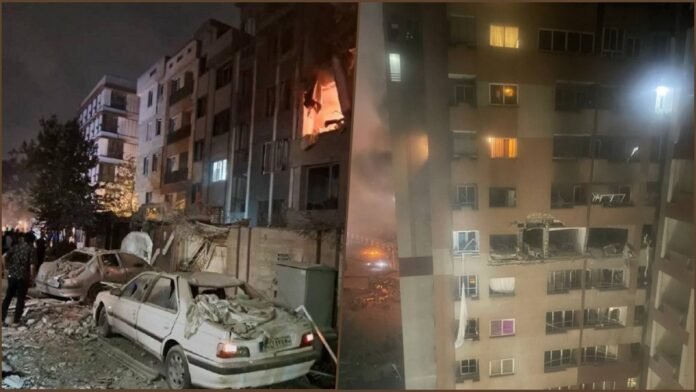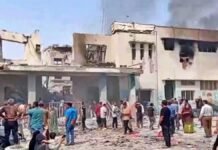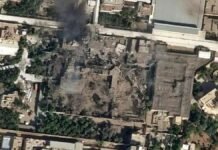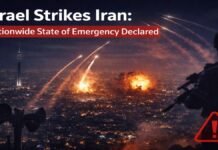
Key Points
- Israel launched large-scale airstrikes on Iran, targeting nuclear facilities, missile factories, and top military leaders, including in Tehran and Natanz.
- Iranian Armed Forces Chief of Staff Mohammad Bagheri and Revolutionary Guards Commander Hossein Salami were among those killed.
- Civilian areas in Tehran were also hit, with reports of women and children among the casualties.
- Israel declared a nationwide state of emergency, closed its airspace, and shut down schools; similar measures followed in Iran, Iraq, and Jordan.
- Iran has vowed severe retaliation, with Supreme Leader Khamenei promising a “bitter and painful fate” for Israel.
- The US, under President Trump, has publicly distanced itself from the strikes and withdrawn embassy staff from the region.
- Global air traffic over the Middle East was disrupted, with civilian flights rerouted away from the conflict zone.
Tehran: precedented escalation, Israel has launched a sweeping series of airstrikes across Iran, marking the most significant military confrontation between the two adversaries in decades. The operation, codenamed Operation Rising Lion, began in the early hours of June 13, 2025, with Israeli fighter jets targeting dozens of locations, including Iran’s most sensitive nuclear facilities, missile production sites, and the residences of top military commanders.
Explosions Rock Tehran and Natanz
Residents of Tehran awoke to multiple explosions around 3:30 a.m. local time, with eyewitnesses describing fireballs and plumes of smoke rising from both military and residential neighborhoods. The Natanz nuclear enrichment facility central to Iran’s uranium program was also struck, as confirmed by the International Atomic Energy Agency. Videos circulating on social media show burning buildings and emergency crews searching for survivors in the debris.
Top Iranian Military Leaders Killed
The Israeli offensive delivered a devastating blow to Iran’s military leadership. Iranian state media and international agencies confirmed the deaths of:
- Major General Mohammad Bagheri, Chief of Staff of Iran’s Armed Forces.
- Major General Hossein Salami, Commander of the Islamic Revolutionary Guard Corps (IRGC).
- Major General Gholam Ali Rashid, head of Khatam ol Anbia Central Headquarters.
- Nuclear scientists Fereydoun Abbasi-Davani and Mohammad Mehdi Tehranchi.
- Several other senior officials and advisers were reported killed or critically injured.
Civilian casualties were also reported, with women and children among the dead after strikes hit residential areas in Tehran.
Israel Declares Emergency, Closes Airspace and Schools
Anticipating Iranian retaliation, Israel swiftly declared a nationwide state of emergency. Defense Minister Israel Katz warned of imminent missile and drone attacks from Iran, urging citizens to seek shelter and follow Home Front Command instructions. Israel’s airspace was closed, Ben Gurion Airport in Tel Aviv suspended all flights, and schools across the country were ordered shut. Neighboring countries, including Iraq and Jordan, also closed their airspace as a precaution.
Iran Vows Retaliation: ‘Bitter Fate’ for Israel
Iran’s Supreme Leader Ayatollah Khamenei condemned the Israeli strikes, vowing a “bitter and painful fate” for Israel. Iranian officials signaled preparations for a major counterattack, raising fears of a regional war. Drone launches and missile alerts were reported in Israel as part of Iran’s immediate response.
US Distances Itself From Conflict
Despite longstanding tensions in the region, the United States, under President Donald Trump, publicly distanced itself from the Israeli operation. The Trump administration emphasized that the strikes were unilateral Israeli actions and confirmed that the US had withdrawn embassy staff and military dependents from the Middle East ahead of the attack. Secretary of State Marco Rubio reiterated that the US was not involved and warned Iran not to target American personnel.
Global Fallout: Airspace Cleared, Markets on Edge
The strikes triggered a dramatic evacuation of civilian airspace over Iran, Israel, Iraq, and Jordan. Commercial flights were rerouted or canceled, causing ripple effects in global aviation and raising concerns about further disruptions if the conflict escalates. Oil prices surged amid fears of a broader Middle East war.
With both sides mobilizing for further action, the world is bracing for a dangerous new phase in the Israel-Iran conflict. The coming days will be critical as Iran weighs its response and the region stands on the brink of a wider war.




















































